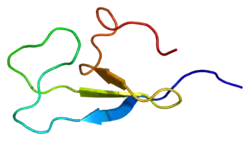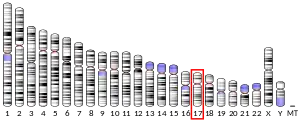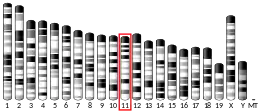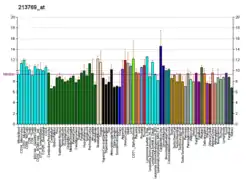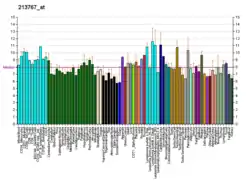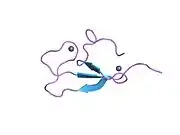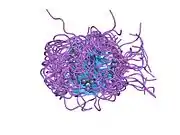KSR1
Kinase suppressor of Ras 1 is an enzyme that in humans is encoded by the KSR1 gene.[5][6]
References
- GRCh38: Ensembl release 89: ENSG00000141068 - Ensembl, May 2017
- GRCm38: Ensembl release 89: ENSMUSG00000018334 - Ensembl, May 2017
- "Human PubMed Reference:". National Center for Biotechnology Information, U.S. National Library of Medicine.
- "Mouse PubMed Reference:". National Center for Biotechnology Information, U.S. National Library of Medicine.
- Therrien M, Chang HC, Solomon NM, Karim FD, Wassarman DA, Rubin GM (Jan 1996). "KSR, a novel protein kinase required for RAS signal transduction". Cell. 83 (6): 879–88. doi:10.1016/0092-8674(95)90204-X. PMID 8521512. S2CID 16975824.
- "Entrez Gene: KSR1 kinase suppressor of ras 1".
Further reading
- Goettel JA, Liang D, Hilliard VC, et al. (2011). "KSR1 is a functional protein kinase capable of serine autophosphorylation and direct phosphorylation of MEK1". Exp. Cell Res. 317 (4): 452–63. doi:10.1016/j.yexcr.2010.11.018. PMC 3038243. PMID 21144847.
- Kolesnick R, Xing HR (2004). "Inflammatory bowel disease reveals the kinase activity of KSR1". J. Clin. Invest. 114 (9): 1233–7. doi:10.1172/JCI23441. PMC 524240. PMID 15520853.
- Xing HR, Lozano J, Kolesnick R (2000). "Epidermal growth factor treatment enhances the kinase activity of kinase suppressor of Ras". J. Biol. Chem. 275 (23): 17276–80. doi:10.1074/jbc.C900989199. PMID 10764733.
- Roy F, Therrien M (2002). "MAP kinase module: the Ksr connection". Curr. Biol. 12 (9): R325–7. doi:10.1016/S0960-9822(02)00831-X. PMID 12007434. S2CID 17763459.
- Strausberg RL, Feingold EA, Grouse LH, et al. (2003). "Generation and initial analysis of more than 15,000 full-length human and mouse cDNA sequences". Proc. Natl. Acad. Sci. U.S.A. 99 (26): 16899–903. doi:10.1073/pnas.242603899. PMC 139241. PMID 12477932.
- Matheny SA, Chen C, Kortum RL, et al. (2004). "Ras regulates assembly of mitogenic signalling complexes through the effector protein IMP". Nature. 427 (6971): 256–60. doi:10.1038/nature02237. PMID 14724641. S2CID 4416552.
- Gerhard DS, Wagner L, Feingold EA, et al. (2004). "The Status, Quality, and Expansion of the NIH Full-Length cDNA Project: The Mammalian Gene Collection (MGC)". Genome Res. 14 (10B): 2121–7. doi:10.1101/gr.2596504. PMC 528928. PMID 15489334.
- Kim M, Yan Y, Kortum RL, et al. (2005). "Expression of kinase suppressor of Ras1 enhances cisplatin-induced extracellular signal-regulated kinase activation and cisplatin sensitivity". Cancer Res. 65 (10): 3986–92. doi:10.1158/0008-5472.CAN-03-2334. PMID 15899786.
- Zody MC, Garber M, Adams DJ, et al. (2006). "DNA sequence of human chromosome 17 and analysis of rearrangement in the human lineage". Nature. 440 (7087): 1045–9. doi:10.1038/nature04689. PMC 2610434. PMID 16625196.
- Wang X, Wang TT, White JH, Studzinski GP (2006). "Induction of kinase suppressor of RAS-1(KSR-1) gene by1, α25-dihydroxyvitamin D3 in human leukemia HL60 cells through a vitamin D response element in the 5′-flanking region". Oncogene. 25 (53): 7078–85. doi:10.1038/sj.onc.1209697. PMC 2843694. PMID 16732322.
- Olsen JV, Blagoev B, Gnad F, et al. (2006). "Global, in vivo, and site-specific phosphorylation dynamics in signaling networks". Cell. 127 (3): 635–48. doi:10.1016/j.cell.2006.09.026. PMID 17081983. S2CID 7827573.
This article is issued from Wikipedia. The text is licensed under Creative Commons - Attribution - Sharealike. Additional terms may apply for the media files.
